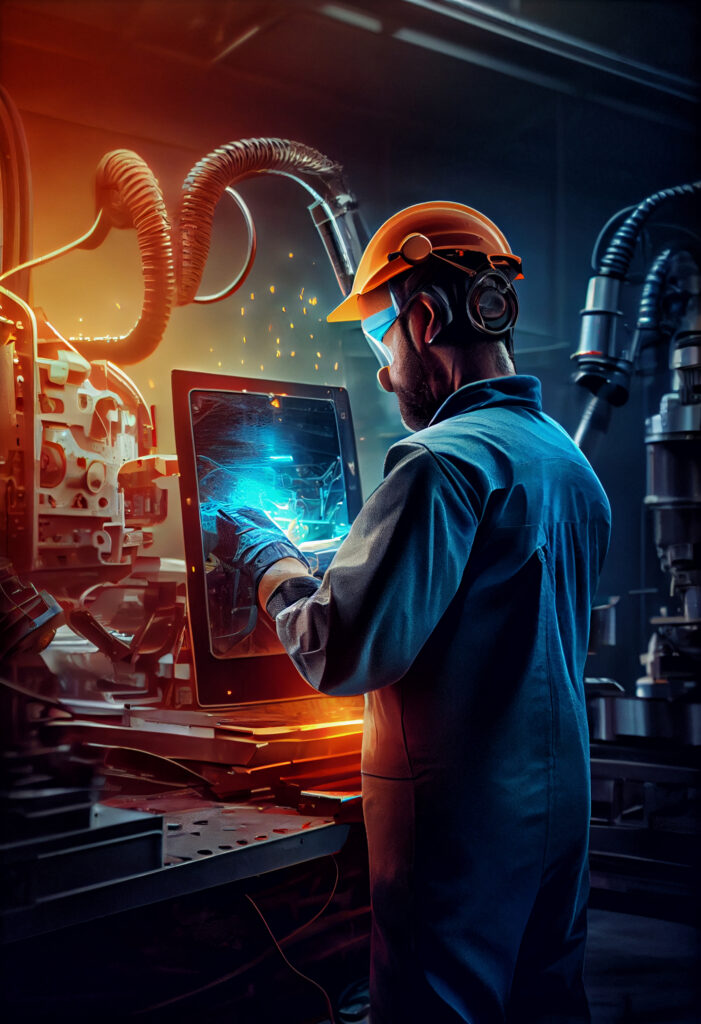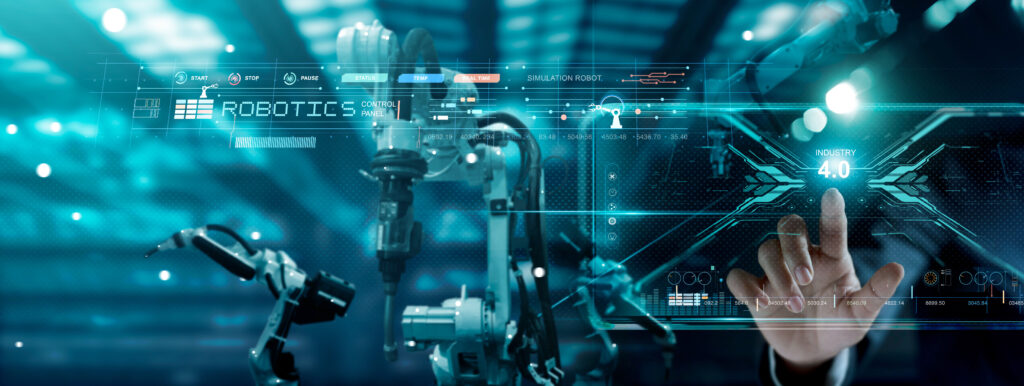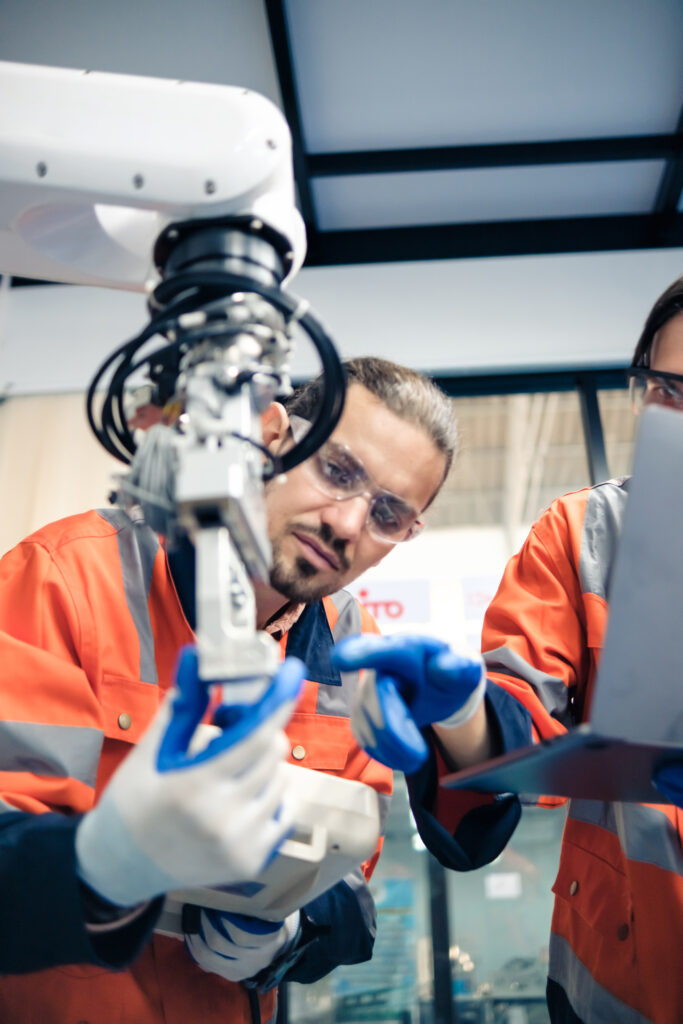Incredible Artificial Intelligence (AI)
And Manufacturers that use it!
Artificial Intelligence (AI) is the ability of machines or computer systems to learn and perform tasks that would typically require human intelligence, such as decision-making, problem-solving, and language processing. In manufacturing, AI is used to optimize processes, increase efficiency, and improve quality. In today’s fast-paced world, moving from design to production must be quicker than ever to stay competitive. Utilizing Artificial Intelligence and other tools, such as Machine Learning and Deep Learning, can help reduce the design and change management timelines.
Here are some ways AI is used in manufacturing:
- Predictive maintenance: AI predicts when machines will require maintenance or repairs using data from sensors and other sources. This helps manufacturers reduce downtime and maintenance costs.
- Quality control: Artificial intelligence analyzes images and detects product defects. This helps manufacturers improve quality and reduce waste.
- Production planning: AI optimizes production schedules based on demand, material availability, and machine capacity. This helps manufacturers produce goods more efficiently and reduce costs.
- Supply chain management: AI is used to optimize supply chain operations by analyzing data on inventory levels, shipping times, and other factors. This helps manufacturers reduce lead times and improve customer satisfaction.
- Robotics: Artificial Intelligence controls robots that perform welding, painting, and assembly tasks. This helps manufacturers automate processes and reduce the need for human labor.
Overall, Artificial Intelligence has the potential to revolutionize the manufacturing industry, making it more efficient, productive, and cost-effective. However, it also poses challenges, such as the need for skilled workers who can design and maintain AI systems and the potential for job displacement as AI takes over tasks previously performed by humans.
What are the advantages of AI In Manufacturing?
There are several advantages of Artificial Intelligence (AI) in manufacturing, including:
- Increased efficiency: AI can help optimize manufacturing processes, reducing the time it takes to complete tasks and improving overall efficiency. This can lead to cost savings and improved productivity.
- Improved quality control: Artificial Intelligence can detect product defects and inconsistencies, leading to higher quality standards and reduced waste.
- Predictive maintenance: Artificial Intelligence can monitor machines and predict when care is needed, reducing downtime and improving equipment lifespan.
- Cost savings: By optimizing processes and reducing waste, AI can help manufacturers reduce costs and increase profitability.
- Better decision-making: AI can analyze large amounts of data and provide insights to help manufacturers make better decisions about everything from production schedules to inventory management.
- Safety: AI-controlled robots can perform dangerous or repetitive tasks, reducing the risk of injury to human workers.
- Customization: AI can help manufacturers produce customized products at scale, allowing them to meet the needs of individual customers more effectively.

Overall, Artificial Intelligence has the potential to revolutionize the manufacturing industry by improving efficiency, reducing costs, and improving quality. By analyzing large amounts of data and making decisions based on that data, AI systems can optimize processes in ways that would be impossible for humans to do manually.
What are the Disadvantages of AI in Manufacturing?
While there are many advantages to using Artificial Intelligence (AI) in manufacturing, there are also some potential disadvantages to consider:
- Cost: Implementing AI technology can be expensive, especially for smaller manufacturers. This includes the cost of the technology and training and hiring skilled workers to operate and maintain the technology.
- Complexity: AI technology can be complex and challenging to implement and maintain. This can require significant time and resources, as well as specialized expertise.
- Job displacement: As machines become more automated and AI becomes more prevalent in manufacturing, there is a risk that some jobs may be displaced or eliminated. This can have negative consequences for workers and their communities.
- Data quality: AI systems rely on high-quality data to function correctly. If the data is complete and accurate, it can lead to correct decisions and suboptimal outcomes.
- Security: AI systems can be vulnerable to cybersecurity threats, putting sensitive data and systems at risk.
- Lack of flexibility: AI systems can be inflexible and may not be able to adapt to changing circumstances as quickly as humans can. This can make responding to unexpected events or changing market conditions challenging.
Overall, while the benefits of Artificial Intelligence in manufacturing can be significant, it’s essential to carefully consider the potential drawbacks and plan how to mitigate them. This includes investing in training and support for workers, ensuring data quality, and implementing robust security measures.
Will Artificial Intelligence in Manufacturing Replace Workers?

The increasing use of Artificial Intelligence (AI) in manufacturing has led to concerns that it could replace workers. While it is true that some jobs may be automated or eliminated as a result of AI, it is essential to note that AI is not intended to replace human workers. Instead, it is designed to augment and assist workers by automating repetitive or dangerous tasks and allowing them to focus on higher-value tasks.
AI can work alongside human workers, making their jobs easier and safer. For example, in a factory, robots controlled by AI can perform dangerous or repetitive tasks for humans. In contrast, humans can focus on tasks that require creativity, problem-solving, and critical thinking.
However, some jobs may be automated due to Artificial Intelligence such as those that are highly repetitive and require little decision-making. But it’s important to note that as some jobs are lost, new ones may be created as companies grow and evolve with the implementation of AI.
Ultimately, the impact of AI on jobs will depend on how it is implemented and integrated into the manufacturing process. With the right policies and training programs, AI can help create new opportunities for workers and improve working conditions.
Case Studies for Using AI in Manufacturing
Many examples of Artificial Intelligence (AI) are used in manufacturing across various industries. Here are a few case studies:
- General Electric (GE) – GE uses AI to optimize production processes by predicting machine failures and identifying inefficiencies. Using sensors and data analytics, GE can expect when machines are likely to fail and schedule maintenance accordingly, reducing downtime and increasing efficiency.
- BMW – BMW uses AI-powered computer vision systems to identify and classify defects in its production process. By analyzing images from its production line, BMW can identify flaws in real time, reducing the number of defective products that reach customers.
- Foxconn – Foxconn, a major electronics manufacturer, uses AI-powered robots to assemble products on its production line. Robots can perform repetitive tasks more quickly and accurately than human workers, improving efficiency and reducing costs.
- Hitachi – Hitachi uses AI to optimize its supply chain by predicting demand and managing inventory levels. By analyzing sales data and historical trends, Hitachi can expect demand for its products and adjust inventory levels accordingly, reducing waste and increasing efficiency.
- Johnson & Johnson – Johnson & Johnson uses AI to optimize its production of medical devices. By analyzing data from its production line, Johnson & Johnson can identify inefficiencies and optimize its processes to improve efficiency and quality.
These are just a few examples of how Artificial Intelligence is used in manufacturing. As AI technology develops, we expect to see even more innovative applications in the manufacturing industry.

Examples of Manufactures using Artificial Intelligence
Many examples of Artificial Intelligence (AI) are used in manufacturing across various industries. Here are some specific examples:
- Predictive Maintenance: AI can predict when machines will likely fail and schedule maintenance accordingly. This can reduce downtime and increase efficiency. For example, General Electric (GE) uses AI to optimize production processes by predicting machine failures and identifying inefficiencies.
- Quality Control: AI-powered computer vision systems can identify and classify product defects. For example, BMW uses AI-powered computer vision systems to identify deficiencies in its production process. This reduces the number of defective products that reach customers.
- Autonomous Robots: AI-powered robots can perform repetitive tasks more quickly and accurately than human workers. This improves efficiency and reduces costs. For example, Foxconn, a major electronics manufacturer, uses AI-powered robots to assemble products on its production line.
- Supply Chain Optimization: AI can predict demand and manage inventory levels. This reduces waste and increases efficiency. For example, Hitachi uses AI to optimize its supply chain by predicting demand and managing inventory levels.
- Process Optimization: AI can analyze data from the production line to identify inefficiencies and optimize processes. This improves efficiency and quality. For example, Johnson & Johnson uses AI to optimize its production of medical devices.
These are just a few examples of how Artificial Intelligence is used in manufacturing. As AI technology develops, we expect to see even more innovative applications in the manufacturing industry.
How Will Artificial Intelligence In Manufacturing Help Society?
Artificial Intelligence (AI) can potentially revolutionize the manufacturing industry in many ways, benefiting society. Here are some ways that AI in manufacturing could help society:
- Increased Efficiency: AI can optimize manufacturing processes, reducing waste and increasing efficiency. This can lead to cost savings for manufacturers, ultimately benefiting consumers through lower prices.
- Improved Quality: AI-powered quality control systems can identify and classify product defects, reducing the number of defective products that reach consumers. This can improve product safety and quality, which benefits society as a whole.
- Safer Workplaces: AI-powered robots can perform dangerous tasks that human workers would otherwise do, reducing the risk of workplace accidents and injuries. This can improve workplace safety and reduce healthcare costs associated with workplace injuries.
- Sustainable Manufacturing: AI can help manufacturers reduce their environmental footprint by optimizing production processes and reducing waste. This can help address climate change and other environmental challenges.
- Better Healthcare: AI-powered medical devices and equipment can improve healthcare outcomes by providing more accurate diagnoses and treatments. This can ultimately improve the health and well-being of individuals and society.

Overall, the benefits of Artificial intelligence in manufacturing have the potential to positively impact society by improving efficiency, quality, safety, sustainability, and healthcare outcomes.
Why is Digital Transformation Important to Manufacturers?
With all the supply chain hiccups over the past few years, manufacturers and their suppliers must get and distribute their products timely. Because of this, Digital transformation has become essential to manufacturers because it enables them to stay competitive in a rapidly changing business landscape. Here are some reasons why digital transformation is vital to manufacturers:
- Improved Efficiency: Digital transformation can help manufacturers optimize their production processes, reducing waste and increasing efficiency. This can lead to cost savings and competitive advantage.
- Better Customer Experience: Digital transformation can help manufacturers connect with customers and provide them with a better experience. This can lead to increased customer loyalty and repeat business.
- Enhanced Agility: Digital transformation can help manufacturers respond more quickly to changes in the market, allowing them to adapt to new trends and customer demands.
- Data-Driven Decision-Making: Digital transformation can give manufacturers valuable insights into their production processes and customer behavior. Manufacturers can stay ahead of the competition by using data to make informed decisions.
- Innovation: Digital transformation can enable manufacturers to innovate and develop new products and services that meet customer needs and preferences.
Overall, digital transformation is essential to manufacturers because it can help them improve efficiency, enhance the customer experience, increase agility, make data-driven decisions, and foster innovation. By embracing digital transformation, manufacturers can stay competitive and thrive in a rapidly changing business environment.
What are the Benefits of Using a Fractional CIO for Implementing AI in Manufacturing?
A Fractional Chief Information Officer (CIO) is an experienced technology executive who works with organizations on a part-time or project basis. When it comes to implementing Artificial Intelligence in manufacturing, there are several benefits to using a Fractional CIO:
- Expertise: Fractional CIOs have extensive experience implementing technology solutions in various industries, including manufacturing. They can provide valuable expertise in developing and executing a strategy for implementing AI in manufacturing.
- Cost-effectiveness: Hiring a full-time CIO can be expensive for smaller manufacturers. Fractional CIOs provide the benefits of an experienced CIO at a fraction of the cost of a full-time employee.
- Flexibility: Fractional CIOs can work on a part-time or project basis, allowing manufacturers to engage their services as needed. This can be particularly beneficial for small and medium-sized manufacturers needing more money for a full-time CIO.
- Reduced Risk: AI implementation can be complex and risky. Fractional CIOs can help mitigate this risk by providing a structured approach to performance and ensuring that the implementation is aligned with the organization’s goals.
- Better ROI: By working with a Fractional CIO, manufacturers can ensure that their investment in AI is aligned with their business goals and is likely to generate a positive return on investment (ROI).
- Reduce Engineering Lifecycle Management(ELM) Time: By working with a Fractional CIO, manufacturers can reduce the development time and speed up change management, saving manufacturers money in creating new designs.
Using a Fractional CIO for implementing Artificial Intelligence in manufacturing can provide manufacturers with the expertise, flexibility, and cost-effectiveness they need to implement Artificial Intelligence and achieve their business goals successfully.
JAYCO CIO Services
As consultants, we aim to become the preeminent provider of CIO Services by educating, mentoring, and helping move our clients forward. We know that people are good at their jobs, and when they fall short, it is usually because of a lack of experience, knowledge, and resources. We can help clients with career path training plans and strategic road maps to incorporate new technologies that can help streamline your company.
With our flexible engagement arrangements, there is no long-term commitment. Because you should only pay for what you need, whether you need someone for a few hours a week or on a project basis, we can help you now.
As Fractional CIO providers, we understand that change can be scary. We won’t push our idea on you. We will listen to your future vision and will put together a roadmap from where your current state of infrastructure is and where the future state will be. Every company has its intricacies that we understand will only fit some companies.
JAYCO CIO Services, founded in 2018, services clients nationwide and offers various CIO services designed to help businesses improve their technology capabilities and move forward, such as Digital Transformation, Block Chain, and ERP migrations. We Provide education, mentorship, and training on new technologies that can be valuable for organizations looking to stay competitive and streamline their operations. It is essential for businesses to continuously learn and adapt to keep up-to-date with the latest technologies and best practices, and the services we offer can be helpful in this regard. If you want to meet our CIOs, click here to read their bios.
At JAYCO CIO Services, We have a holistic approach to working with executive officers, stakeholders, and IT teams to understand the current state of a business’s technology and identify areas for improvement that can be an effective way to help organizations move forward and achieve their goals. JAYCO CIO Services can provide an assessment and follow up with a report detailing the assessment findings. This report can be a valuable tool for helping businesses understand where to focus their efforts to make progress.
Check out our FREE eBook on Industry 4.0
Do you have more questions or want to talk to someone about how Fractional CIO services can help your company?







